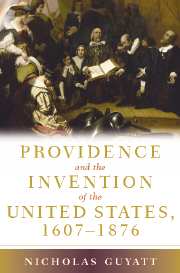Introduction
Published online by Cambridge University Press: 12 December 2009
Summary
On January 28, 2003, George W. Bush delivered his State of the Union address to Congress at a difficult moment in his presidency. Facing an ailing economy and the prospect of war with Iraq, Bush sought to reassure Americans not only of his political competence but of a higher purpose to the nation's history. “We Americans have faith in ourselves,” the president noted at the conclusion of his speech, “but not in ourselves alone. We do not know – we do not claim to know all the ways of Providence, yet we can trust in them, placing our confidence in the loving God behind all of life and all of history.” While the President's religious rhetoric unsettled some observers, his suggestion of a divine role in American policy making is hardly unique.
At first glance, one might see this providential theme as an unbroken thread, reaching back from George W. Bush across the entirety of American history. His references to a divine plan recall the rhetoric of Ronald Reagan, Woodrow Wilson, Abraham Lincoln, and a host of other prominent Americans. Indeed, a founding myth of America holds that the Puritans of New England inaugurated this divine mission, settling with God's approval in a hostile New World and producing a mighty empire from an empty wilderness. From this vantage point, President Bush's references to Providence are merely the most recent public iteration of a very old theme: God was responsible for both the founding of Massachusetts in 1629 and the invasion of Baghdad in 2003.
- Type
- Chapter
- Information
- Publisher: Cambridge University PressPrint publication year: 2007

